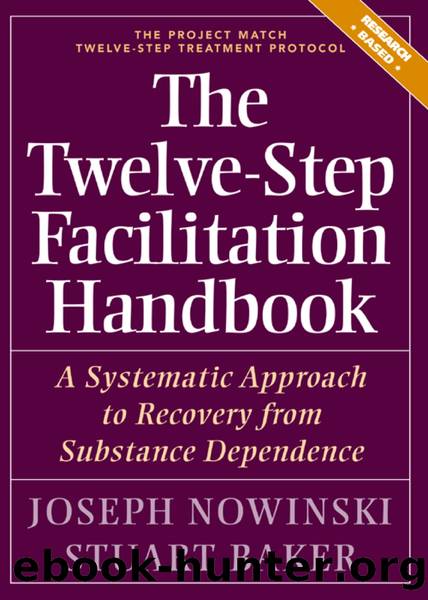The Twelve Step Facilitation Handbook by Joseph Nowinski

Author:Joseph Nowinski
Language: eng
Format: epub
Publisher: Hazelden Publishing
Explain to the patient that all of the above are exactly the right times to call!
Work through the patientâs resistances to using the telephone as much as possible, using role playing (practice) if necessary, and suggest telephoning as a recovery task for the next week.
Sponsors
The facilitator should explain to the patient that the use of sponsors is one of the oldest traditions in AA, predating even telephone therapy. Originally, sponsors had a much more limited role in recovery than they do today. They were people who took responsibility for visiting alcoholics in the hospital and for taking them to AA meetings when they were discharged. Sponsors were also used as resources for answering questions about material in the Big Book.
Today all twelve-step programs incorporate sponsorship into their traditions. Sponsors are obtained through meetings. But their role today is different from what it once was. They do not visit inpatients or take them to meetings, although to some extent sponsors still âexplainâ the Big Book to newcomers. But perhaps most important, sponsors today serve as sources of practical advice for people who are less experienced with recovery than they. The sponsor is someone the patient can call (in addition, hopefully, to other AA/NA friends), who provides basic information about AA and NA and their traditions, who helps answer questions about the steps, who steers the patient toward meetings that might be helpful, and who facilitates getting active. Even people who have been in recovery for many years are apt to have sponsors, though their sponsors may be peers in terms of recovery.
It is a privilege and a responsibility to be a sponsor. But there are some things a sponsor is not. A sponsor is not a therapist or a judge. A sponsor does not tell a patient what to do (although s/he may offer a suggestion or two if asked). A sponsor does not attempt to resolve personal or marital problems, offer moral judgments, or give a patient a job. Despite these limitations, there is plenty of room for sponsors to help. A sponsor understands from personal experience the agonies of addiction and the conflicts that face the newly recovering alcoholic or addict. The sponsor sincerely cares about the patient and is an allyâbut not a best friend, an employer, or a surrogate parent. The difference lies in the caring detachment that good sponsorship requires.6
Characteristics of Sponsors. We recommend that the facilitator explain to the patient how to go about getting a sponsor. But first, explore any of the patientâs resistances to getting a sponsor. What concerns or reservations does the patient have? What qualities would s/he like in a sponsor (age, background)? NA suggests these ground rules:
Anyone who has the desire to stay clean and sober should have a sponsor.
The patient should not have a sponsor with whom s/he might have a sexual relationship.
A patient should have only one sponsor at a time.
A sponsor should have at least several months of âclean time,â though what is more important than the quantity of clean time is the quality of that time.
Download
This site does not store any files on its server. We only index and link to content provided by other sites. Please contact the content providers to delete copyright contents if any and email us, we'll remove relevant links or contents immediately.
| Adult Children of Alcoholics | Alcoholism |
| Drug Dependency | Gambling |
| Hoarding | Obsessive Compulsive Disorder (OCD) |
| Sexual | Smoking |
| Substance Abuse | Twelve-Step Programs |
The Hacking of the American Mind by Robert H. Lustig(3616)
Right Here, Right Now by Georgia Beers(3535)
Fingerprints of the Gods by Graham Hancock(3257)
Goodbye Paradise(3019)
Bad Pharma by Ben Goldacre(2756)
Happiness by Matthieu Ricard(2551)
More Language of Letting Go: 366 New Daily Meditations by Melody Beattie(2475)
The Social Psychology of Inequality by Unknown(2346)
Drugs Unlimited by Mike Power(2210)
The Plant Paradox by Dr. Steven R. Gundry M.D(2069)
Confessions of a Shopaholic by Sophie Kinsella(1900)
Borders by unknow(1810)
Make Love Not Porn by Cindy Gallop(1772)
Dry by Augusten Burroughs(1702)
Stop Being Mean to Yourself: A Story About Finding the True Meaning of Self-Love by Melody Beattie(1669)
Getting Off by Erica Garza(1636)
Yoga and the Twelve-Step Path by Kyczy Hawk(1550)
Weed, Inc. by Ben Cort(1525)
Unmasking Male Depression by Archibald D. Hart(1519)
